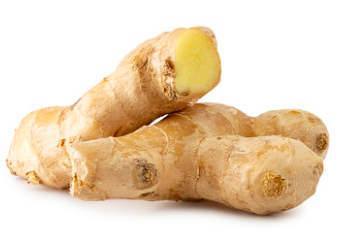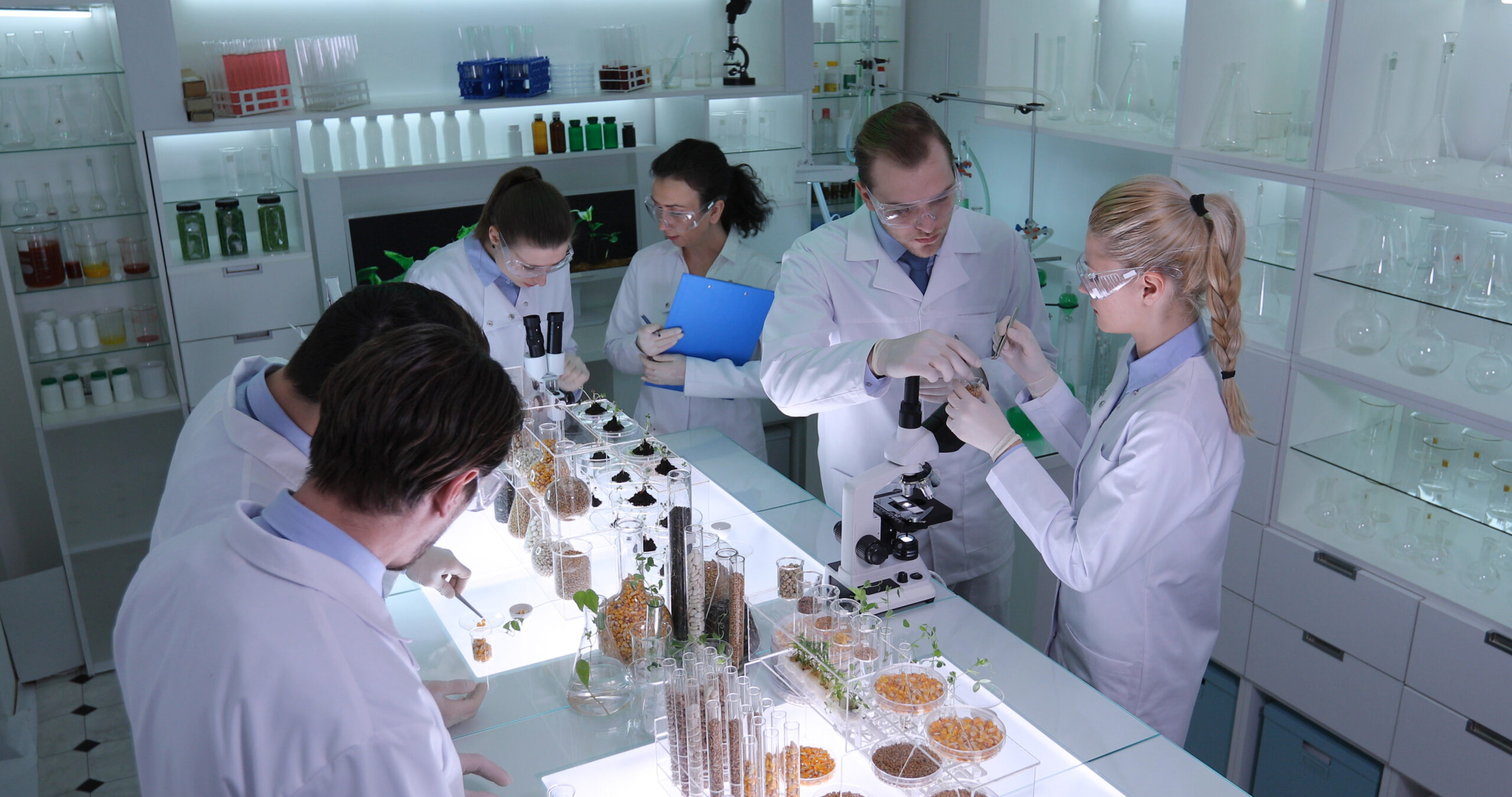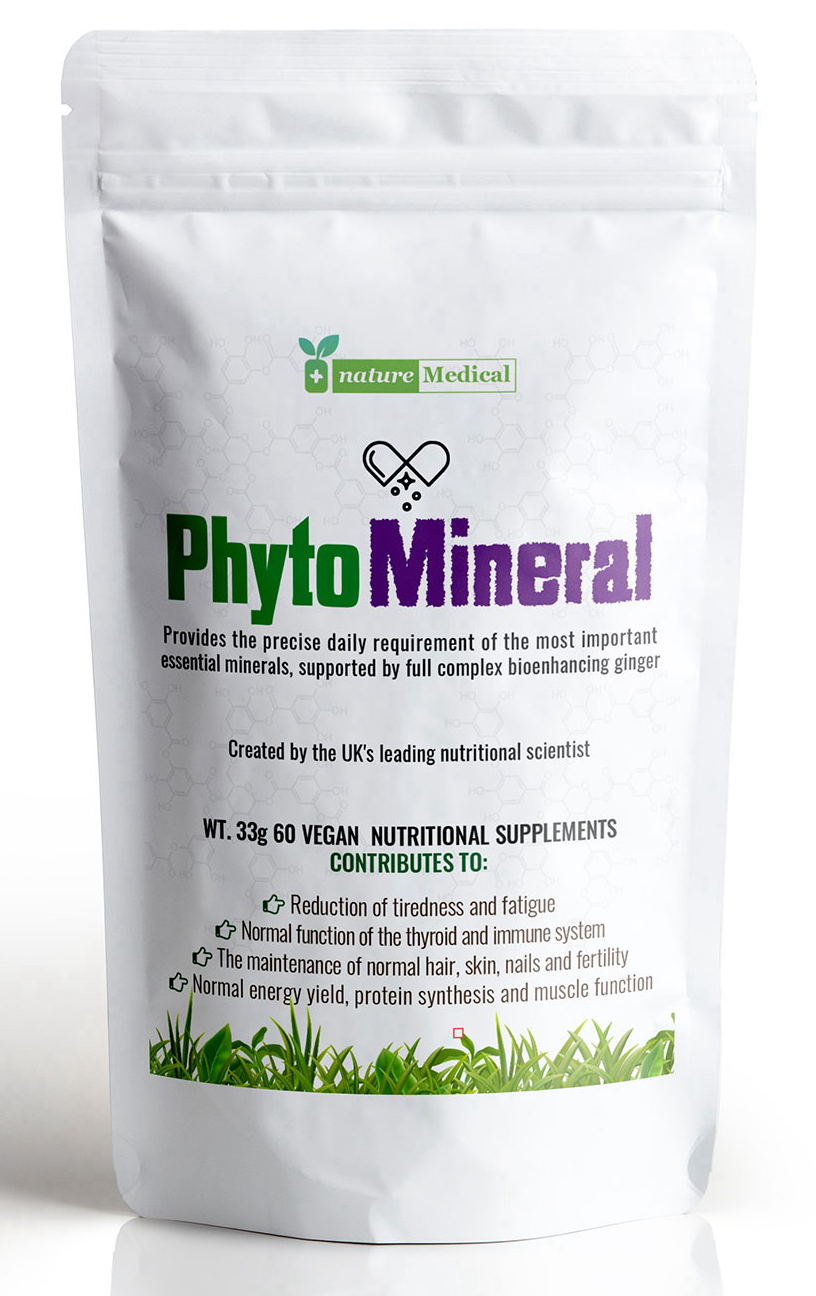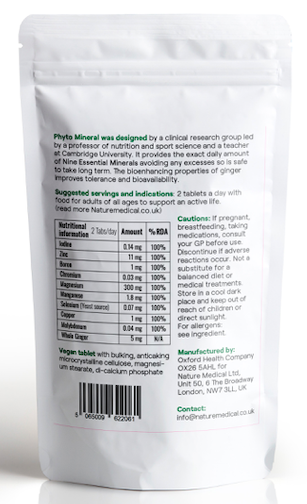About PhytoMineral
PhytoMineral was designed and evaluated by a team of leading nutritional research scientist to provide the precise daily requirements of the most important essential mineral supplements, uniquely supported by whole ginger – rich in bioenhancing natural phytochemicals.
Why was PhytoMineral created: Suboptimal levels of minerals are becoming alarmingly commonplace. As countries get richer, the diversity of the typical diet actually shrinks. Today, most of the world’s food supply comes from only 12 plants and five animal species. What’s more, in the race to get large quantities of affordable food, modern intensive farming, over cleaning and processing are depleting minerals from many foods on the shelves1. The latest study reported that up to 75% of society has suboptimal levels one of more essential trace minerals especially iodine.
What are trace minerals and what foods contain them: Minerals are usually derived from healthy metals and salts in food and drinks. Although it may be difficult to maintain normal mineral levels, with a typical western diet, several dietary tips can certainly improve the diversity of mineral intake such as increasing intake of seafood, pumpkin, seaweed and nut intake – read more about how to increase intake and what are minerals in food
What minerals does the body need and how many minerals does the body need: The more important, rarer trace minerals are found in PhytoMineral at the precise quantities to supply exactly 100% of the recommended daily allowance of minerals per day (no more no less):
- Zinc 11mg/day
- Boron 1 mg /day
- Chromium 0.03mg / day
- Selenium 0.07 mg / day
- Molybdenum 0.04 mg/day
- Magnesium 300 mg /day
- Manganese 1.8 mg /day
- Copper 1 mg/day
- Iodine 0.14 mg / day
What do minerals do for the body and why are minerals important. Minerals are essential for the normal function of the body including the formation of protein, bone and cartilage, gut wall cells, production of hormones and immune factors. Minerals are needed for production of anti-oxidants enzymes which protect us from toxins and chronic degenerative diseases such as dementia, heart disease, arthritis, cancer and premature skin ageing 2-8. Normal levels of essential minerals are vital for multiple metabolic pathways and good quality supplements, such as PhytoMineral, have been shown to have multiple health benefits by contributing to normal:
- thyroid and other hormone formulation
- carbohydrate and energy-yielding metabolism
- cognitive and brain function
- testosterone, libido, fertility, sperm formation and reproduction
- metabolism of vitamins and iron transportation
- fatty acids and protein synthesis and muscle function
- maintenance of normal bones, teeth, hair, nails and skin
- maintenance of the nervous system and vision
- function of the immune system
Advantages of mineral supplements. A well-made mineral supplement is a convenient way to ensure adequate intake evenly across the day.
Phytomineral has been developed by team of nutritional researches led by a Professor of sports and nutrition, a teacher of exercise science at Cambridge University. Professor Robert Thomas has developed and researched several nutraceutical supplements over the years publishing their results in international scientific journal and meetings. He also has been advising nutritional interventions following nutritional analyses for thousands of patients based on their blood and hair analysis, so has first had experience on the level of the common prevalent mineral deficiencies and excesses in our society. The trouble is, even with the hundreds of varieties of supplements available over the counter, it’s difficult to find one which contains the optimal blend. Many omit really import minerals such as iodine which is now worryingly deficient in the UK diet or have inadequate quantities of other minerals so would have little impact on body levels. Of more concern, some over the counter supplements have far too high a level of one or more minerals, so with long term use could lead to harmful excess levels.

What minerals in Food and phytoMineral
Why does it contain ginger (Zingiber officinale Roscoe) is a perfect complement to a mineral supplement. Firstly, it is naturally rich in minerals including calcium, zinc and copper. Second, it has anti-sickness properties and improves motility of the gastrointestinal tract which counterbalances any potential indigestion or slight nausea which can occur with some minerals. Third, it contains “gingerols” and other healthy phytochemicals which protects the body from toxins and oxidative stress by supporting the body’s antioxidant enzymes further enhancing the benefits of copper, zinc and selenium which are also required for the anti-oxidant enzymes. Forth, it helps improving gut mucous membranes integrity, reducing gut and systemic inflammation, improving a sense of wellbeing, reduces leakage of nutrients out of the body yet facilitates absorption and bioavailability of micronutrients and minerals, but unlike peperine does not increase absorption or reduce metabolism of other drugs 10-18
 Quality assurance and safety: PhytoMineral is manufactured by a team with extensive knowledge of the correct choice and concentrations of minerals with safety for short and long term use. Each batch is tested for impurities and unexpected allergens. The Oxford factory has the highest level Good Manufacturing Practice (GMP) certification including Food Safety System certification (FSSC). Ginger is very safe and has tissue protective properties. As It provides the exact RDA of each mineral avoiding over intake of any variety, ensuring its safety and effectiveness for long term intake.
Quality assurance and safety: PhytoMineral is manufactured by a team with extensive knowledge of the correct choice and concentrations of minerals with safety for short and long term use. Each batch is tested for impurities and unexpected allergens. The Oxford factory has the highest level Good Manufacturing Practice (GMP) certification including Food Safety System certification (FSSC). Ginger is very safe and has tissue protective properties. As It provides the exact RDA of each mineral avoiding over intake of any variety, ensuring its safety and effectiveness for long term intake.
Who would benefit most: Men and women of all ages to support an active life especially those with a recent or current illnesses, those eating a less than perfect diets and individuals embarking on a regular, especially intense, exercise training programme or trying for a baby.
Cautions: If pregnant, breastfeeding, taking medications, consult your GP before use. Discontinue if adversereactions occur. Not a substitute for a balanced diet or medical treatments. For allergens – see list of ingredient. other commonly asked questions are addressed below”
What is the difference between vitamins and minerals?
References:
- Thomas R. How to Live (2022) Short books. (Waterstones)
- Ryan-Harshman M et al. Health benefits of selected minerals. Can Fam Physician. 2005 May;51(5):673-5. PMID: 15934270; PMCID: PMC1472933.
- Food and Nutrition Board, Institute of Medicine.Dietary reference intakes Minerals. Washington, DC: National Academy Press; 1999.
- Zemel MB. Role of dietary calcium and dairy products in modulating adiposity. 2003;38:130–146. [PubMed] [Google Scholar]
- Food and Nutrition Board, Institute of Medicine.Dietary reference intakes for selenium. Washington, DC: National Academy Press; 2000]
- Rayman MP. The importance of selenium to human health. 2000;356:233–241.
- Food and Nutrition Board, Institute of Medicine.Dietary reference intakes boron, chromium, copper, iodine, iron, manganese, molybdenum, nickel, silicon, vanadium, and zinc. Washington, DC: National Academy Press; 2002. [PubMed] [Google Scholar]
- European Food Safety Authority Allowed health claims for minerals (2023): https://nutraceuticalsgroup.com/uk/full-list-of-efsa-health-claims/
- Chandra RK. Nutrition and the immune system from birth to old age.Eur J Clin Nutr. 2002;56(Suppl 3):73–76.
- Harvard Medical information. Minerals for health https://www.health.harvard.edu/staying-healthy/precious-metals-and-other-important-minerals-for-health
- Kaul PN et al. Ginger: herbal drugs and their critical appraisal–part II. Prog Drug Res. 2001;57:1-75. PMID: 11727999.
- Thomson M et al. The use of ginger as an anti-inflammatory and antithrombotic agent.Prostaglandins Leukotrienes and Essential Fatty Acids. 2002;67(6):475–8. [PubMed]
- Grzanna R, et al. Ginger – a herbal medicinal product with broad anti-inflammatory actions.Journal of Medicinal Food. 2005;8(2):125–132. [PubMed]
- Ojewole J et al Analgesic, antiinflammatory and hypoglycaemic effects of Ginger.Phytotherapy Research. 2006;20(9):764–772. [PubMed]
- Kim JK et al. gingerol prevents UVB-induced ROS production and COX-2 expressionin vitro and in vivo . Free Radical Research. 2007;41(5):603–614. [PubMed]
- Bode A et al. The Amazing and Mighty Ginger. In: Benzie IFF, Wachtel-Galor S, Herbal Medicine: Biomolecular and Clinical Aspects. www.ncbi.nlm.nih.gov/books/NBK92775/
- Qazi GN et al. Bioavailability enhancing activity of Zingiber officinale and its extracts/fractions thereof. United States Patent Number, US2003/0170326A1, 2003.
- Dudhatra G et al A Comprehensive Review on Pharmacotherapeutics of Herbal Bioenhancers 2012; 2012: 637953. doi: 10.1100/2012/637953
- Krishnamurthy HK, Reddy S, Jayaraman V et al. (2021) Effect of Micronutrients on Thyroid Parameters. Journal of thyroid research 2021, 1865483.
- Dugbartey AT (1998) Neurocognitive Aspects of Hypothyroidism. Archives of Internal Medicine 158, 1413-1418.
- Akintola A, Jansen S, van Bodegom D et al. (2015) Subclinical hypothyroidism and cognitive function in people over 60 years: a systematic review and meta-analysis. Frontiers in Aging Neuroscience 7.
- Samuels MH (2014) Psychiatric and cognitive manifestations of hypothyroidism.Current opinion in endocrinology, diabetes, and obesity 21, 377-383.
- Beydoun MA, Beydoun HA, Kitner-Triolo MH et al. (2013) Thyroid Hormones Are Associated With Cognitive Function: Moderation by Sex, Race, and Depressive Symptoms. The Journal of Clinical Endocrinology & Metabolism 98, 3470-3481.
- Pérez-Lobato R, Ramos R, Arrebola JP et al. (2015) Thyroid status and its association with cognitive functioning in healthy boys at 10 years of age. European Journal of Endocrinology 172, 129-139.
- Hernandez A (2019) Cognitive function in hypothyroidism: what is that deiodinase again? The Journal of Clinical Investigation 129, 55-57.


